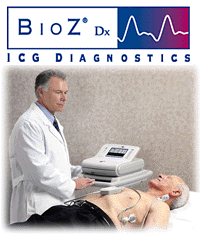- TheraTrakTM status report provides visit-to-visit information on cardiac flow, resistance, contractility, and fluid status
- Assists with drug management of cardiovascular medications including ACEs, beta blockers, CCBs, and diuretics
- Easy to use, requires no special training
- Over 10,000 physicians are using ICG data to help improve patient care
ICG Clinical Applications
Heart Failure
- Most powerful predictor of short-term CHF events. Compared to vital signs, weight, clinical and patient assessment1
- Independent predictor of long-term CHF events compared to BNP2
Hypertension - Double Your BP Control
- Doubles BP control (<130/85 mm Hg) in non-resistant hypertension3
- Improves BP control 70% in resistant hypertension4
- 44% lower cost for each mmHg of reduced systolic BP and 71% lower cost for each mmHg of reduced diastolic BP1

Dyspnea
- Changes patient diagnosis 13% and therapy 39% of the time5
- Compared to previous studies evaluating standard monitoring tools such as pulse oximetry and BNP, ICG testing had a more significant impact on therapeutic decision-making

Reimbursement:
ICG has its own CPT code (93701) that was issued by the AMA in 2002. ICG is nationally-approved by Medicare for five patient indications including heart failure and dyspnea. In most states, the local Medicare carrier also covers ICG for drug resistant hypertension. Multiple private insurers such as Aetna, Tricare/Humana and some BlueCross BlueShield and Medicaid carriers also cover ICG. Reimbursement information for your state is available upon request.
1 Packer M, et al. Jrl Am Coll Cardiol. 2006;47(11):2245-52.
2 Castellanos L, et al. Jrl Card Fail. 2009;41(1):41-47.
3 Smith RD, et al. Hypertension. 2006;47:769-775.
4 Taler S, et al. Hypertension. 2002;39:982-988.
5 Peacock F, et al. Acad Emerg Med. 2006;13(4):365-371.



